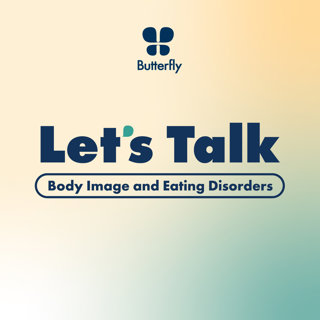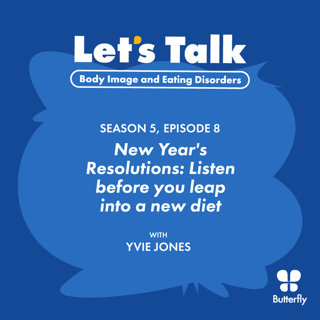
Let’s Talk: New Year’s Resolutions: Listen Before You Leap into a New Diet
In this episode of Let’s Talk, Yvie sits down with Jackson Rose, Helpline Supervisor at Butterfly Foundation, to explore the hidden risks of New Year’s resolutions. While the desire to improve or change ourselves isn’t inherently problematic, black-and-white thinking about ‘good’ and ‘bad’ behaviours—particularly around food and exercise—can carry serious psychological and physical risks. Jackson shares insights into how societal pressures and rigid resolutions around weight loss and fitness can do more harm than good, offering practical tips on how to recognise and navigate these challenges in the new year. Whether you’re feeling uneasy about your body after the holiday festivities or worried about a loved one, this episode encourages a more balanced, compassionate, and sustainable approach to self-care. Resources:Butterfly National Helpline: 1800 33 4673 (1800 ED HOPE)Chat onlineIf you feel you may be at risk, check out our screening tool here.Find professionals screened for their understanding of eating disorders here.Resources can be found here. ConnectFollow Yvie Jones on Instagram here.Follow Butterfly Foundation on Instagram here. Production Team:Produced by Yvie Jones and Annette Staglieno from Classic Me ProductionsExecutive Producer: Camilla BecketSupported by the Waratah Education FoundationSee omnystudio.com/listener for privacy information.
1 Jan 13min
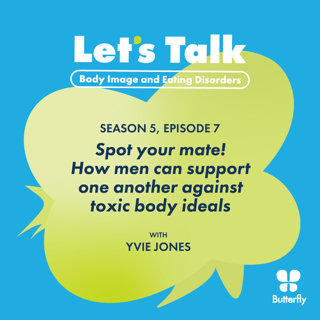
Spot your mate! How men can support one another against toxic body ideals
In this episode, Yvie explores the challenging issue of body image pressures facing men and, with her guests, examines how toxic standards impact male self-perception. How can men support one another and challenge these harmful expectations to create greater body acceptance and more compassionate spaces for their own bodies and others? Joining Yvie are: Konan Masuda, an 18-year-old with lived experience, candidly discusses the pressures young men face from peers, social media, and societal expectations, providing a raw look at how these challenges can shape their self-image. Brock McLean, a former AFL star, opens up about his battle with bulimia nervosa during and after his career in elite sports. Brock sheds light on the intense pressures athletes face to meet physical and performance ideals, and how acknowledging his vulnerability and seeking help became key to his healing. Nic Bloom, a mental health first aid trainer and advocate, shares invaluable, actionable advice on identifying body image struggles in men, starting supportive conversations, and breaking through the stigma that often prevents men from seeking help. This episode explores the cultural and psychological factors driving toxic body standards for men, offering hope, practical strategies, and a call to action aimed at breaking the silence, reshaping ideals, and encouraging men to speak out. Resources: Butterfly National Helpline: 1800 33 4673 (1800 ED HOPE) Chat online Download your personalised support script to take to your GP here. Find professionals screened for their understanding of eating disorders here. Resources can be found here. Connect: Follow Yvie Jones on Instagram here. Follow Butterfly Foundation on Instagram here. Find out more about Konan Masuda. Find out more about Brock McLean. Find out more about Nic Bloom. Production Team: Produced by Yvie Jones and Annette Staglieno from Classic Me Productions Executive Producer: Camilla Becket Supported by the Waratah Education Foundation If you're concerned about an eating disorder for yourself or someone you care about, please reach out to the Butterfly National Helpline or chat online with one of their specialist counselors. Remember, it's okay to seek a second opinion if you feel misunderstood. Recovery is possible with the right support. See omnystudio.com/listener for privacy information.
3 Dec 202445min
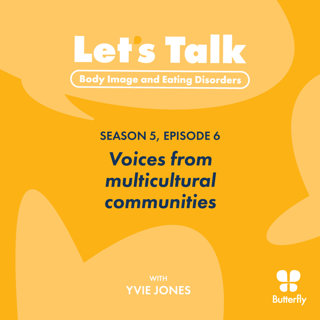
Voices From Multicultural Communities
In this episode of ‘Let’s Talk’, Yvie dives into a meaningful conversation about body image and eating disorders, specifically within multicultural communities. Despite the pervasive nature of eating disorders across backgrounds, unique cultural and linguistic barriers can often amplify the challenges for those seeking support and understanding. Yvie is joined by two courageous women who share their experiences navigating cultural expectations and stigma; the discussion highlights barriers to accessing healthcare and the unique challenges these communities face. Psychologist Anila Azhar from Glebe Point Road Psychology adds insight into the importance of culturally sensitive care, addressing common challenges professionals face in treating diverse patients and offering strategies to improve support for individuals from varied cultural backgrounds. Resources: Butterfly National Helpline: 1800 33 4673 (1800 ED HOPE) Chat online Download your personalised support script to take to your GP here. Find professionals screened for their understanding of eating disorders here. Additional resources can be found here Connect Follow Yvie Jones on Instagram here Follow Butterfly Foundation on Instagram here Learn more about Anila Azahar and her practice here Production Team: Produced by Yvie Jones and Annette Staglieno from Classic Me Productions Executive Producer: Camilla Becket Supported by the Waratah Education Foundation For more information about this episode, visit butterfly.org.au/podcast and click through to this episode. Next Steps: If you're concerned about an eating disorder for yourself or someone you care about, please reach out to the Butterfly National Helpline or chat online with one of their specialist counsellors. Remember, it's okay to seek a second opinion if you feel misunderstood. Recovery is possible with the right support.See omnystudio.com/listener for privacy information.
5 Nov 202433min
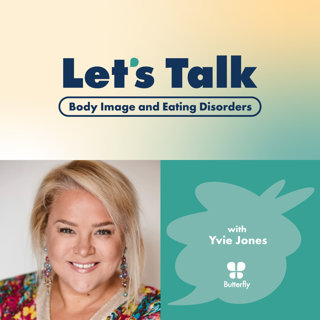
A GP’s guide to navigating Eating Disorders with compassion and care.
In this episode of "Let's Talk," our new host, Yvie Jones, speaks with Dr. Preeya Alexander about the vital role of General Practitioners (GPs) in supporting patients with body image issues and eating disorders. Dr Preeya shares her unique insights into how GPs can build trust with their patients, collaborate with specialists, and navigate the challenges of treating eating disorders with sensitivity and care. We learn how social media misinformation fueled Dr Preeya’s passion for addressing body image issues and eating disorders and explore the impact of unconscious bias in patient care, plus how GPs can recognise early warning signs by understanding key risk factors and symptoms. Dr Preeya also offers practical advice for GPs on approaching patients who may have eating disorders by using compassionate and culturally sensitive language to build trust. The goal is commitment to their recovery. Resources Mentioned in This Episode: Butterfly National Helpline: 1800 33 4673 (1800 ED HOPE) Free, confidential support from specialist counsellors. Chat online Support Script: Download your personalised support script to take to your GP here. Butterfly Referral Database: Find professionals screened for their understanding of eating disorders here. Follow Dr. Preeya Alexander: Instagram: @doctor.preeya.alexander Follow Yvie Jones: Instagram: @Yvie_Jones Production Team: Produced by Yvie Jones and Annette Staglieno from Classic Me Productions Executive Producer: Camilla Becket Supported by the Waratah Education Foundation For more information about this episode, visit butterfly.org.au/podcast and click through to this episode. Next Steps: If you're concerned about an eating disorder for yourself or someone you care about, please reach out to the Butterfly National Helpline or chat online with one of their specialist counsellors. Remember, it's okay to seek a second opinion if you feel misunderstood. Recovery is possible with the right support.See omnystudio.com/listener for privacy information.
1 Okt 202431min
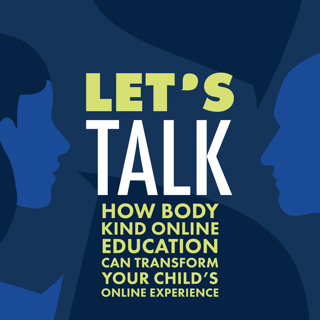
How Body Kind Online Education can transform your child’s online experience
In today's digital age, young people are constantly bombarded with images and messages on social media that can deeply impact their wellbeing, including their body image. Navigating this landscape can be challenging, both for young people and the parents, carers, and educators who support them. How can we guide young people through the ever-evolving digital world? In this episode, three experts share their invaluable insights: Hannah Jarman, Research Fellow in the School of Psychology at Deakin University, explores the complex and far-reaching influences of social media on body image and eating disorders, shedding light on how these platforms can shape young minds. Cara Webber, from Education, Prevention and Inclusion at the eSafety Commissioner, discusses strategies for creating safer online experiences for young people and protecting them from online harms. Zoe Bradbury, Communications Specialist at Butterfly, shares her firsthand experiences with the harms of social media, having faced her own challenges with an eating disorder. Today, she works to improve online spaces by challenging myths and stereotypes and promoting kinder, more inclusive attitudes around bodies. Tune in as we discuss actionable techniques and skills that will empower anyone who supports young people online, and introduce BodyKind Online Education, a new, engaging eLearning program for Australian secondary schools developed by Butterfly in collaboration with other key experts. Whether you're a parent, educator, or caregiver, this episode is both a guide to BodyKind Online Education, as well as a tip-sheet to help you support the body image of the young people you love so they can have a more positive and safer experience online. Find out more about body kind online education This project was funded by the eSafety Commissioner’s Online Safety Grants Program.See omnystudio.com/listener for privacy information.
24 Sep 202432min
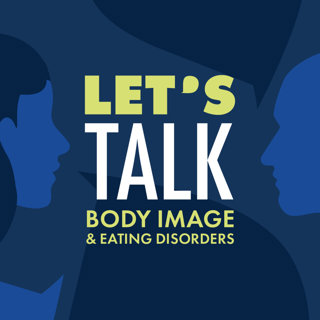
Why are we red flagging men and their fitness goals?
The myth that eating disorders only affect women means there are still too many men who aren’t getting help. While it’s great to see more women accepting and celebrating their bodies for the way they were born to be, body image issues and eating disorders are mental health issues that do not discriminate. The difference is that they often look different in men, who are more likely to over exercise, abuse muscle building substances and engage in unsustainable diets. In pursuit of a big, tall, muscular and lean ideal, destructive behaviours can easily lead to both physical problems and psycho-social distress. Our guest, Alex Rodriguez, went through his own battle with eating and exercise, became an accredited dietitian, and now supports other men in recovery. “Our worth as men, or as human beings, is not determined by what we look like, nor how we eat, nor how good we are at “insert name’ exercise,” he says. "Much of my work includes normalising and destigmatising mental health experiences. I just want the world to be a safer, less judgemental, more accepting place." Listen to Alex on body ideals in relation to men, their experience of eating disorders, and how a sympathetic health professional can support a more genuine and sustainable health. Find out more about Alex Rodriguez Find a Health ProfessionalSee omnystudio.com/listener for privacy information.
6 Aug 202427min

All you need to know about the Butterfly National Helpline
There can be shame, guilt and fear attached to a struggle with one’s body or eating, not to mention confusion about whether you, or your loved one, may have a diagnosable or treatable problem. These are just some of the reasons why too many people don’t ask for help. It’s a pity, because talking to a professional can be life-changing. That’s why the Australian Government provides funding to the Butterfly National Helpline, a free and discreet information and support service available to anyone, anywhere in Australia. It's a safe space to connect with a trained counsellor; all you need is the courage to take that first step. “You need somebody who understands how complex and multifaceted eating and body image-related struggles can be,” says Ayesha Khan, the Helpline’s Clinical Operations Lead. “Everyone is welcome to contact us with their questions or concerns. Typically, people experiencing an issue with their eating behaviours reach out, but it could also be their family members or friends. Many health professionals contact us too. ”We asked Ayesha to walk us through how to use the Helpline, what it can and cannot do, what help-seekers can expect when they connect, and her insider’s view of the service. Tune in to our latest episode to discover how the Butterfly National Helpline can support you, your loved one, or your client. Contact the Butterfly National Helpline If you are in crisis contact Triple Zero If you are in crisis, contact Lifeline If you are a young person in crisis, contact Kids HelplineSee omnystudio.com/listener for privacy information.
23 Juli 202419min

Updating the 8 Keys to Recovery with Carolyn Costin
Carolyn Costin is one of the most well-known names in eating disorder recovery treatment. Her book, Eight Keys to Recovery from an Eating Disorder, is a pioneering work that was published more than a decade ago and is still regarded as a central text in the field. Some people think of eating disorders in terms of addiction, with programs to actively get drugs, alcohol, and other addictions out of one’s life. The problem is you can’t do that with food: “You have to learn how to deal with it”, says Carolyn. “It's very different.” Her eight keys provide insights and steps for facing the daunting task of recovery. From her own lived experience, and extensive work in the field, Carolyn clarifies the overarching topics for us to work through and come to the other side of this illness. In fact, she's had a hand in numerous initiatives to progress full recovery throughout her career. She developed the first residential treatment centre in the United States that has been replicated in other countries, including Australia. She’s also training recovery coaches to address the very real gaps in care. Carolyn is perennially interesting, and her message of hope is always enlightening. Read the 8 keys to recovery from an eating disorder Learn more about Wandi Nerida residential treatment Learn more about Carolyn CostinSee omnystudio.com/listener for privacy information.
9 Juli 202434min
